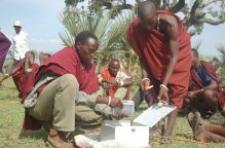Participatory planning, monitoring and evaluation

Ga direct naar: Zoeken | Hoofdmenu | Snelkoppelingen
You are here: Home » KIT Information & Library Services » ILS Information products » PARTICIPATORY PLANNING, MONITORING AND EVALUATION
KIT Dossier Participatory planning, monitoring and evaluation
-
Deconcentration
or administrative decentralization concerns transfers of power to local branches of the central state, such as prefects, administrators, or local technical line ministry agents. These upwardly accountable bodies are appointed local administrative extensions of the central state. They may have some downward accountability built into their functions, but their primary responsibility is to central government. Generally, the powers of deconcentrated units are delegated by the supervising ministries. Deconcentration is a 'weak' form of decentralization because the downward accountability relations from which many benefits are expected are not as well-established as in democratic or political forms of decentralization.
-
Delegation
is when public functions are transferred to lower levels of government, public corporations or any other authorities outside of the regular political-administrative structure to implement programmes on behalf of a government agency.
-
Devolution
is often used to refer to any transfer from central government to any non-central-government body -including local elected governments, NGOs, customary authorities, private bodies, etc.
-
Decentralization
Decentralization is usually referred to as the transfer of powers from central government to lower levels in a political-administrative and territorial hierarchy (Crook and Manor 1998, Agrawal and Ribot, 1999; in: Yuliani, 2004).
-
Political decentralization
or democratic decentralization occurs when powers and resources are transferred to authorities representative of and downwardly accountable to local populations. Democratic decentralization aims to increase public participation in local decision-making. Through greater participation, democratic decentralization is believed to help internalize social, economic, developmental and environmental externalities, to better match social services and public decisions to local needs and aspirations; and to increase equity in the use of public resources. Through entrustment of locally accountable representative bodies with real public powers, the ideals of public choice and participatory or community-based approaches to development converge. Democratic decentralization is in effect an institutionalized form of the participatory approach. The terms political and democratic decentralization can be used interchangeably. These are ‘strong' forms of decentralization from which theory indicates the greatest benefits can be derived.
-
Participation
The involvement of actors in the process of making decisions that will affect them, including what is to be done and how. In a RAAKS study, planning for the inclusion and meaningful participation of those who have typically been called 'beneficiaries' or 'target groups' is essential. Successful use of participative approaches requires respect for others' knowledge and experience and willingness to involve them in implementing, contributing, sharing and evaluating proposed solutions. Participation may involve individuals, groups or their representatives. The quality of participation has a great impact on the outcome of the process, and can greatly increase the chance that key actors will support the results - so that action results. Decisions in this area are probably the most important of any taken by a RAAKS team.
-
Stakeholders
Actors whose interests are affected by a particular area of human activity, whether as victims or beneficiaries. In a RAAKS study, generally those who are concerned with maintaining or changing performance in this area. (See 'The AKIS perspective' in Chapter 1.) As with actors, stakeholders may be individuals, organizations, legal entities, etc.
-
Governance
Governance has been defined as the rules of the political system to solve conflicts between actors and adopt decision (legality). It has also been used to describe the "proper functioning of institutions and their acceptance by the public" (legitimacy). And it has been used to invoke the efficacy of government and the achievement of consensus by democratic means (participation)
Source: UNDP -
Social inclusion
Social inclusion of service provision essentially refers to the access to services by the most vulnerable farmers in rural society. (http://www.kit.nl/net/KIT_Publicaties_output/showfile.aspx?e=1333)
-
Accountability
as far as M&E is concerned, demonstrating to donors, beneficiaries and implementing partners that expenditure, actions and results are as agreed or are as can reasonably be expected in a given situation (Jim Woodhill, 2006).

Related items
Snelkoppelingen
Agenda News Press Working at KIT About KIT Cookies Contact
Nederlands -English




